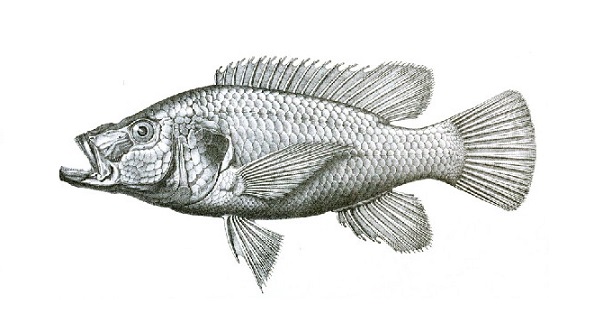
Though not one of the more frequently mentioned animals in the Bible, the fish, and everything associated with it as a food, occurs more frequently—and evenly distributed between the two testaments—than we migh expect.

Tristramella sacra, endemic to the Sea of Galilee, that has not been seen since 1990.
Fish in the Bible
The fish is mentioned infrequently in the Pentateuch, appearing for the first time as one of the categories of creatures over which humans were to exercise dominion (Gen 1:26-28). In the wilderness they pined for "the fish we ate in Egypt at no cost—also the cucumbers, melons, leeks, onions and garlic" (Num 11:5). Fish is not regulated by any of the levitical food laws.
Jerusalem had a Fish Gate since before the 7th Cent BC, which suggests that fish was an important food item for the Jews (2 Chron 33:14). Nehemiah complained about that "men from Tyre who lived in Jerusalem were bringing in fish and all kinds of merchandise and selling them in Jerusalem on the Sabbath to the people of Judah" (Neh 13:16). Though it is possible for fresh fish to be brought up to Jerusalem from Joppa on the coast, most would have been dried or salted. The Sea of Galilee would also have been a major source. The Old Testament tells of spears (Job 41:7), fishhooks (Job 41:1; and nets (Eccl 9:12; Isa 19:8; Eze 26:5) being used to catch them. It is interesting to observe that no specific individual in the Old Testament is listed as a fisherman. Jonah alone holds the record for being caught by a fish rather than catching one (Jon 1:17-2:10).
All but one (1 Cor 15:39) of the New Testament's references to fish are found in the four Gospels. This is not surprising since Jesus' earliest disciples are mostly fishermen; his call to them was to become "fishers of men." Many of Jesus' miracles in Galilee occurred in towns and villages devoted to the fish industry and trade, including Capernaum, Bethsaida, and Magdala (the Sea of Galilee is home to some 22 species of fish, including several species of tilapia). Feeding the hungry almost always involved fish (Matt 14:14ff; 15:34ff; Mk 6:38ff; 8:1ff; Lk 9:12ff).
Luke alone reports how the quite clearly miraculous catch so stunted Simon Peter into conviction of his own sinfulness and begging to be cleansed (5:1ff). But John reports the resurrected Lord appearing to the disciples while they were fishing, and ate a breakfast of bread and roasted fish with them. Jesus then challenged Simon Peter, asking three time if he loved him, and then reminding him to feed his sheep (Jn 21:1ff).
Among the most potent images of the Kingdom of heaven is the fishermen catching a great haul, sorting out the good from the bad ones which will be thrown away (Matt 13:47-49).
Probably the most heart-warming piece of Jesus's teachings in which the fish appears as a motif must be Matt 7:9-11//Lk11:11-13:
Which of you, if his son asks for bread, will give him a stone? Or if he asks for a fish, will give him a snake? If you, then, though you are evil, know how to give good gifts to your children, how much more will your Father in heaven give good gifts to those who ask him!
Finally, Paul settled the controvery in the Corinthian church over with what kind of a body would the dead raised by pointing out that just as humans, animals and fish have different kinds of bodies so will the resurrected be new and different (1 Cor 15:39).
Fish & the Modern Christian Lifestyle
Most Christians continue to consume fish, esp., marine ones, as if nothing has happened, but the human population is living on the edge of a major environmental crisis in which we, Christians in particular, can play an important role. Since the 1970s marine fish population has plummeted; there is no longer any instance in which it could be claimed that marine fish can be caught and consumed in manners that can be called "sustainable." In his highly significant video documentary, Seaspiracy, its director Ali Tabrizi shows how many of the NGOs that claim to protect the ocean against such environmentally destructive practices are in fact part of the ugly scam for profit. The only "sustainable" kind of fish we can buy, nowadays, are those we buy directly from the fishermen who go out to sea everyday and sell their catch without a middle-man or agent. What can Christians do to help renew today's very sick ocean and plummeting fish population? Very quickly, here are three practical suggestions. 1) Watch Seaspiration. 2) Take creation care seriously. 3) Limit your consumption of marine fish (which are loaded with mercury and other industrial pollutants), perhaps, to only once or twice a year. 3) Switch your preference of fish to tilapia, one of the most sustainably farmed fresh-water fish available (but don't rear them—they can be highly invasive); you can claim you are eating the kind of fish Jesus and the early disciples most certainly ate (though they would have been surprised, if we can bring them back to our time, to see what the tilapia has become as a result of breeding).

See also Fish Symbol, Creation Care.

©ALBERITH
250116lch/u060621